A consulting contract is a written agreement between a consultant and a client that outlines the scope of services to be provided, the payment terms, and any other obligations and expectations of both parties.
This document serves as a legally binding agreement and helps to ensure that both the consultant and the client have a clear understanding of their responsibilities, expectations, and rights throughout the consulting engagement. Whether you are a consultant or a client, it is important to have a well-written consulting contract in place to avoid misunderstandings and ensure a successful outcome.
Table of Contents
What Is a Consulting Services Agreement?

A consulting service agreement is a legal contract between a consultant and their client that outlines the terms and conditions of their consulting services. The agreement covers topics such as the scope of services provided, payment, confidentiality, intellectual property rights, and other important details related to the consulting relationship. The purpose of the agreement is to ensure that both parties have a clear understanding of their obligations and responsibilities and to help protect their interests.
Consulting Contract Templates
Consulting contract templates are pre-designed documents that provide a structured format for creating legally binding agreements between a consultant or consulting firm and a client. These templates offer a convenient and professional way to outline the terms and conditions of the consulting engagement, ensuring clarity and protection for both parties involved.
Consulting contract templates typically include sections that address important aspects such as the scope of work, project deliverables, timelines, compensation, confidentiality, intellectual property rights, termination conditions, and any additional provisions or requirements specific to the engagement. They may also incorporate sections for capturing the details of the consultant and client, as well as any terms related to dispute resolution or liability.
Using a consulting contract template helps consultants and clients establish a clear understanding of their rights and obligations regarding the consulting services to be provided. The template provides a structured format that simplifies the process of creating the contract and ensures that all necessary details are properly documented and communicated.
What to Include in a Consulting Agreement or Contract
A consulting agreement or contract typically includes the following elements:
Description of services: A detailed description of the consulting services to be provided by the consultant.
Timeframe: The start and end dates of the agreement and the estimated time required to complete the services.
Payment terms: The amount of compensation to be paid to the consultant and the payment schedule.
Confidentiality clause: A clause that restricts the consultant from disclosing confidential information about the client’s business.
Termination clause: The conditions under which the agreement can be terminated and the responsibilities of both parties upon termination.
Liability and indemnification: A clause that limits the consultant’s liability for damages and indemnifies the client for any losses that may occur during the engagement.
Intellectual property: A clause that specifies who will own the intellectual property created during the engagement.
Dispute resolution: A clause that outlines the process for resolving disputes between the parties.
Governing law: A clause that specifies the law that governs the agreement.
Different Forms Of Consulting Agreements
There are several forms of consulting agreements, each with its own specific purpose and terms. Here are a few common types:
Independent Contractor Agreement
This agreement outlines the terms between a consultant and their client for a specific project or timeframe. It typically includes the scope of work, payment terms, and any non-compete clauses.
Retainer Agreement
This type of agreement is often used when a client wants to retain a consultant for an ongoing period of time, rather than for a specific project. The consultant is paid a set fee for their time and services.
Time and Materials Agreement
This agreement is used when a project’s scope is not well defined, and the consultant is paid for the time and materials they use to complete the project.
Fixed-Fee Agreement
In this agreement, the consultant is paid a set fee for a specific project, regardless of the amount of time or resources they use to complete it.
Joint Venture Agreement
This agreement outlines the terms between two or more consultants working together on a project. It typically includes provisions for ownership, management, and profits.
Each of these forms of consulting agreements has its own unique benefits and drawbacks, so it is important to consider which one is best suited to your needs before entering into a consulting contract.
The Difference Between a Consulting Agreement vs Consulting Proposal
A consulting agreement is a legally binding document that outlines the terms of a consulting relationship between a consultant and their client. It covers details such as the scope of the project, payment terms, the timeline, and any other important terms.
On the other hand, a consulting proposal is a non-binding document that outlines a consultant’s proposed solution to a client’s problem or challenge. It includes an overview of the services to be provided, the estimated cost, and the consultant’s qualifications. The purpose of a consulting proposal is to convince the client to hire the consultant, while a consulting agreement outlines the terms of the engagement if it is accepted.
How to Write a Consulting Contract
A consulting contract is a written agreement between a consultant and a client that outlines the terms and conditions of the consulting services to be provided. It serves as a roadmap for both parties, detailing the scope of work, compensation, confidentiality, and other important aspects of the relationship.
A well-written consulting contract can help to prevent misunderstandings and conflicts, and ensure that both parties have a clear understanding of their obligations and responsibilities. Here are the steps for writing a comprehensive consulting contract:
Define the Scope of Work
Clearly define the consulting services that the consultant will provide, including the specific tasks, deliverables, and timelines.
Determine the Compensation
Establish the payment terms, including the amount, frequency, and method of payment. Consider if there will be any bonuses, incentives, or penalties tied to specific performance metrics.
Include Confidentiality Provisions
Address how confidential information will be handled, including any non-disclosure agreements or confidentiality clauses.
Address Intellectual Property
Specify how any intellectual property created during the course of the consulting services will be owned and managed.
Include Termination and Termination Fees
Define the circumstances under which either party may terminate the agreement, and include provisions for termination fees if applicable.
Include Liability and Indemnification Provisions
Clearly state who is responsible for any legal disputes or liabilities that may arise from the consulting services.
Include Dispute Resolution Provisions
Outline the process for resolving any disputes between the consultant and client, such as mediation or arbitration.
Address Governing Law and Jurisdiction
Specify which laws and jurisdiction will govern the agreement.
Include Signature and Dates
Both parties should sign and date the contract, and retain a copy for their records.
It’s important to remember that a consulting contract is a legally binding document, so it’s recommended to consult a lawyer before finalizing it.
FAQs
What should be included in a Consulting Contract?
A Consulting Contract should include the scope of work, payment terms, schedule, confidentiality clauses, and other important details related to the consulting project.
How long should a Consulting Contract be?
The length of a Consulting Contract will vary depending on the complexity of the project, but it should be detailed and comprehensive enough to cover all necessary aspects of the project.
What happens if a consultant breaches the terms of the Consulting Contract?
If a consultant breaches the terms of the Consulting Contract, the client may be able to seek legal remedies, including damages or termination of the contract.
Can a Consulting Contract be amended after it has been signed?
Yes, a Consulting Contract can be amended after it has been signed, but both the consultant and the client must agree to the changes in writing.
What is a consulting contract?
A consulting contract is a legal agreement that defines the terms of the relationship between a client and a consultant. It details the services to be provided, obligations of both parties, timelines, deliverables, intellectual property rights, compensation, and other relevant terms.
What are the most common consulting contract types?
The three most common types are fixed-fee, time and materials, and retainer contracts. Fixed-fee contracts involve a set price for a defined project. Time and materials contracts bill hourly or daily rates. Retainer contracts provide a retainer payment upfront for availability.
What are the key components of a consulting contract?
The main components of a consulting contract are:
- Scope of work – Detailed description of consulting services to be delivered.
- Timeline – Deadlines, milestones, and timeframes for completing the work.
- Deliverables – Specific outcomes the consultant will provide.
- Fees/Expenses – Payment terms, invoicing, reimbursements.
- Intellectual property – Who owns materials, products, inventions created.
- Confidentiality – Non-disclosure terms.
- Termination – Conditions for ending the contract early.


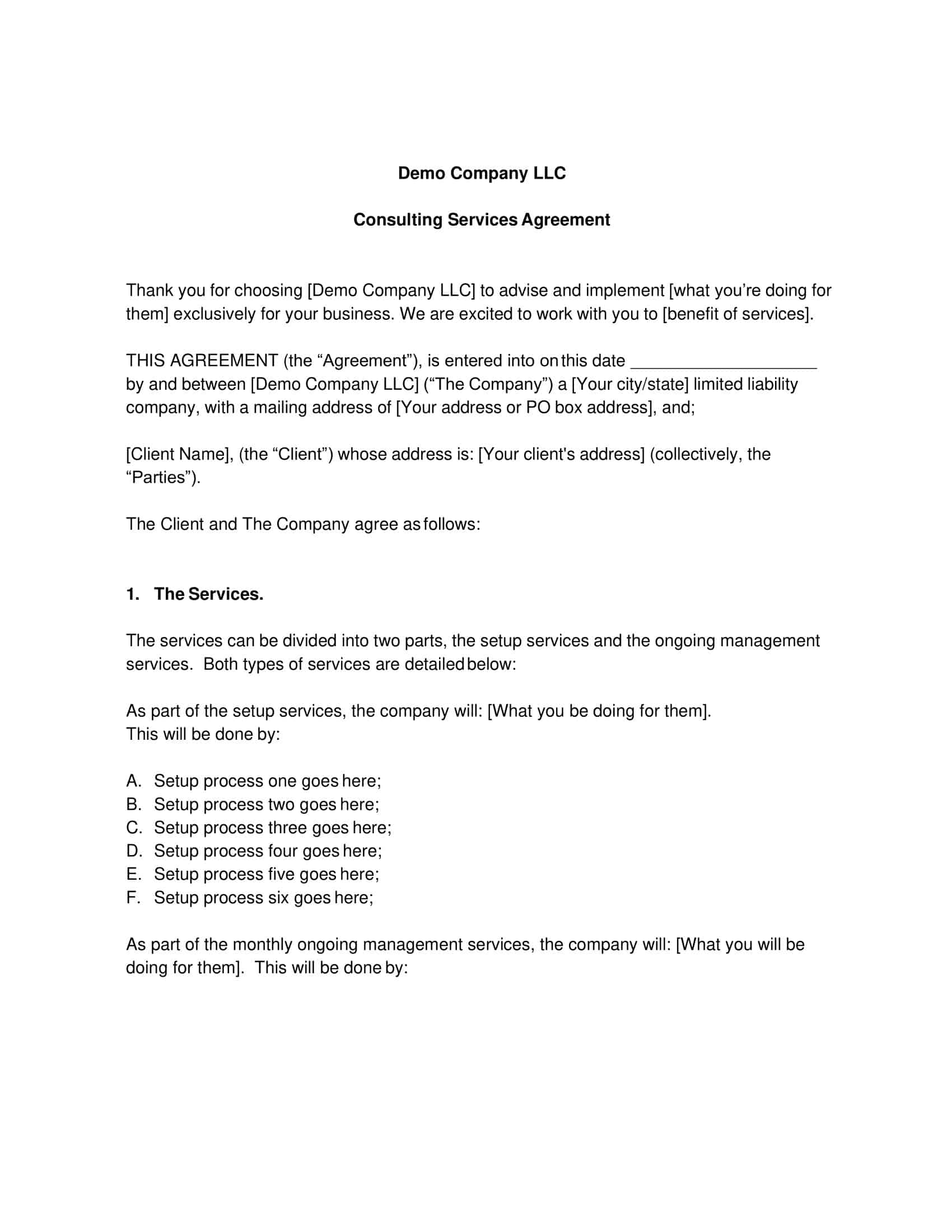
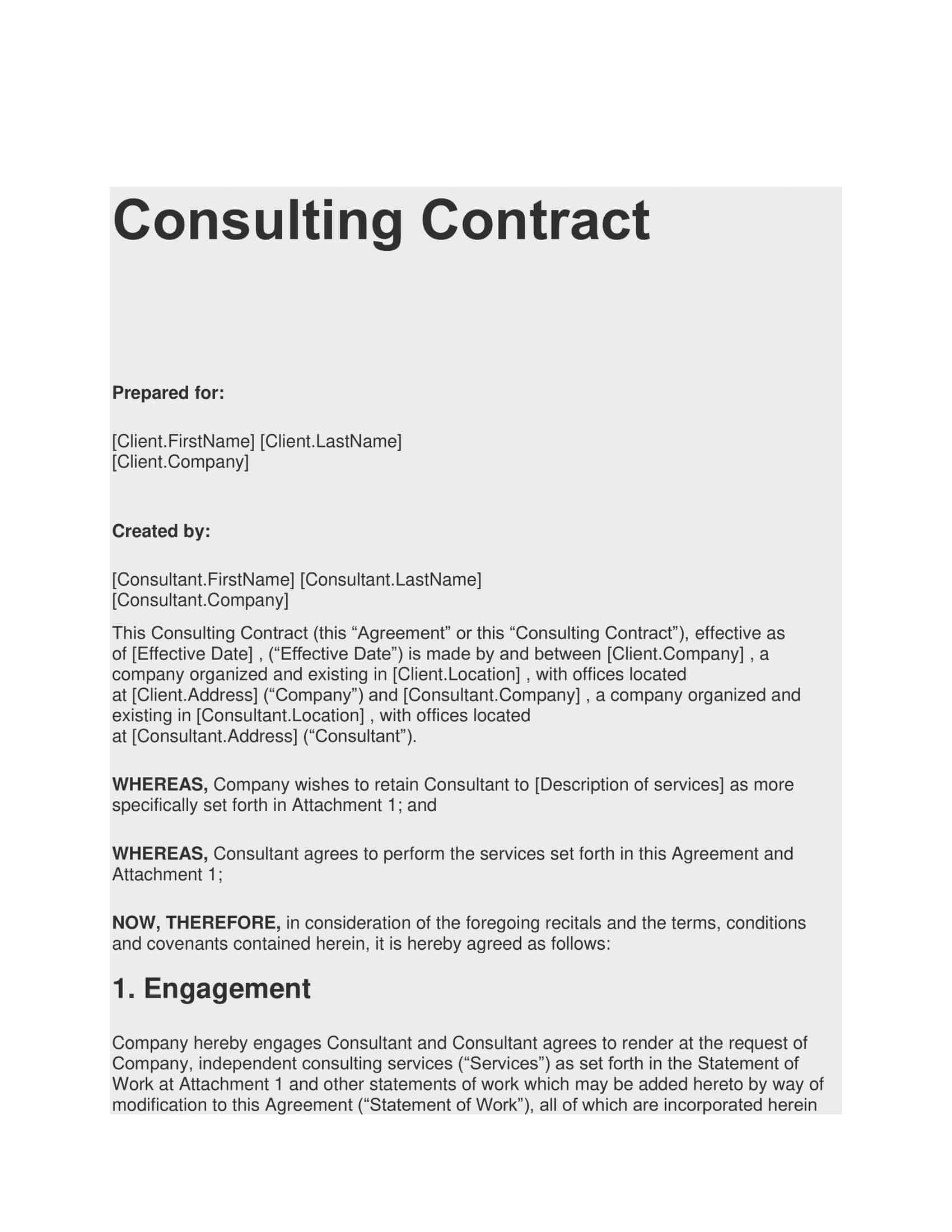













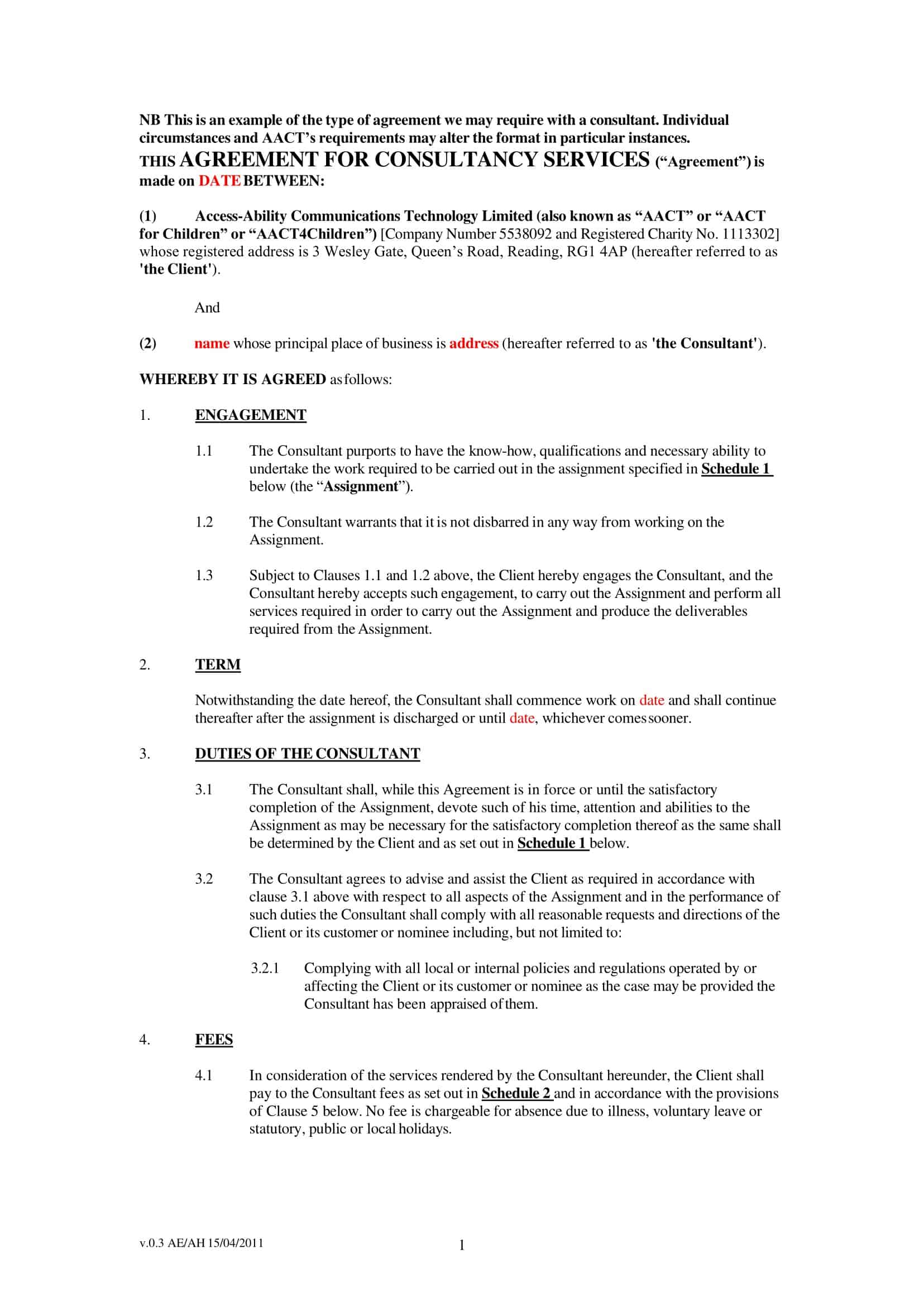
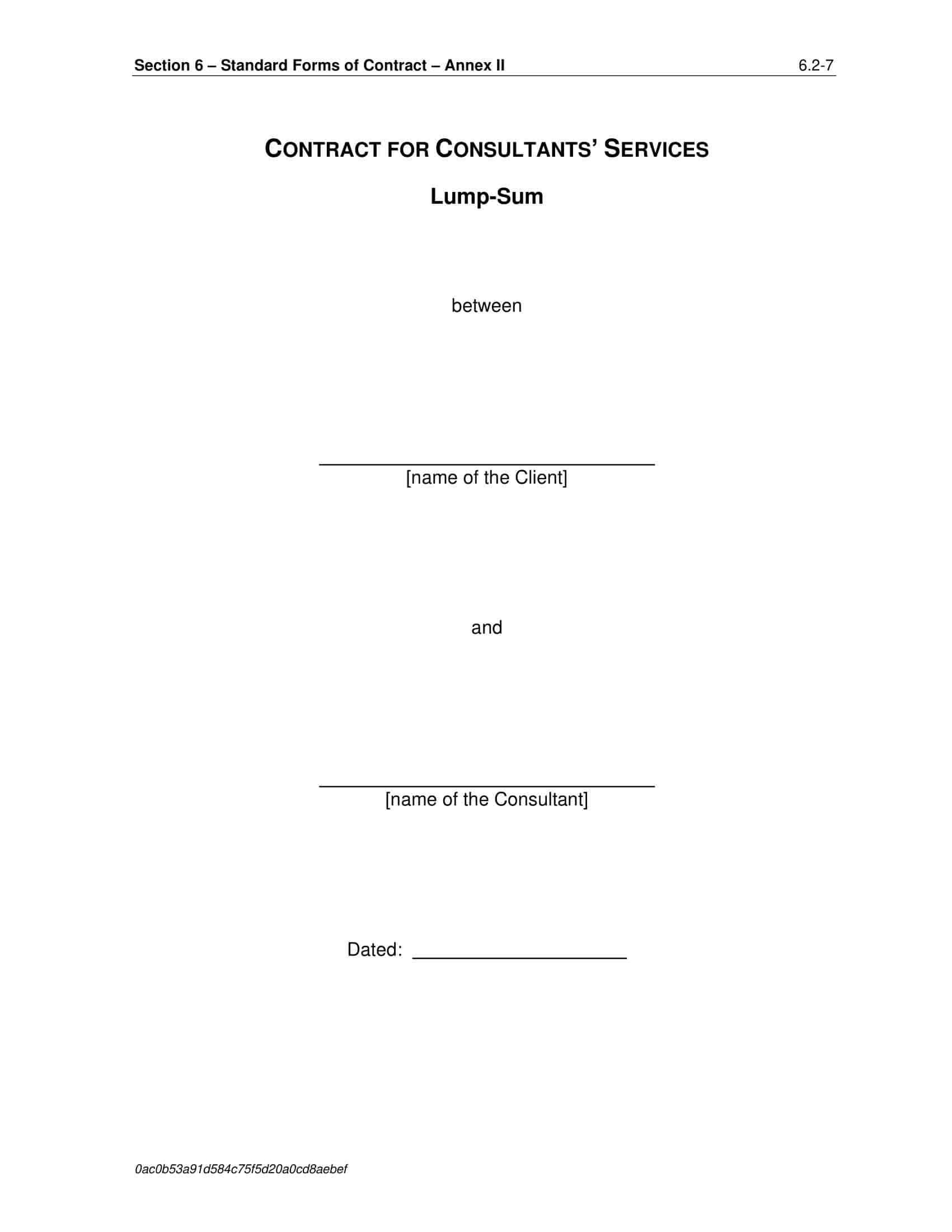
















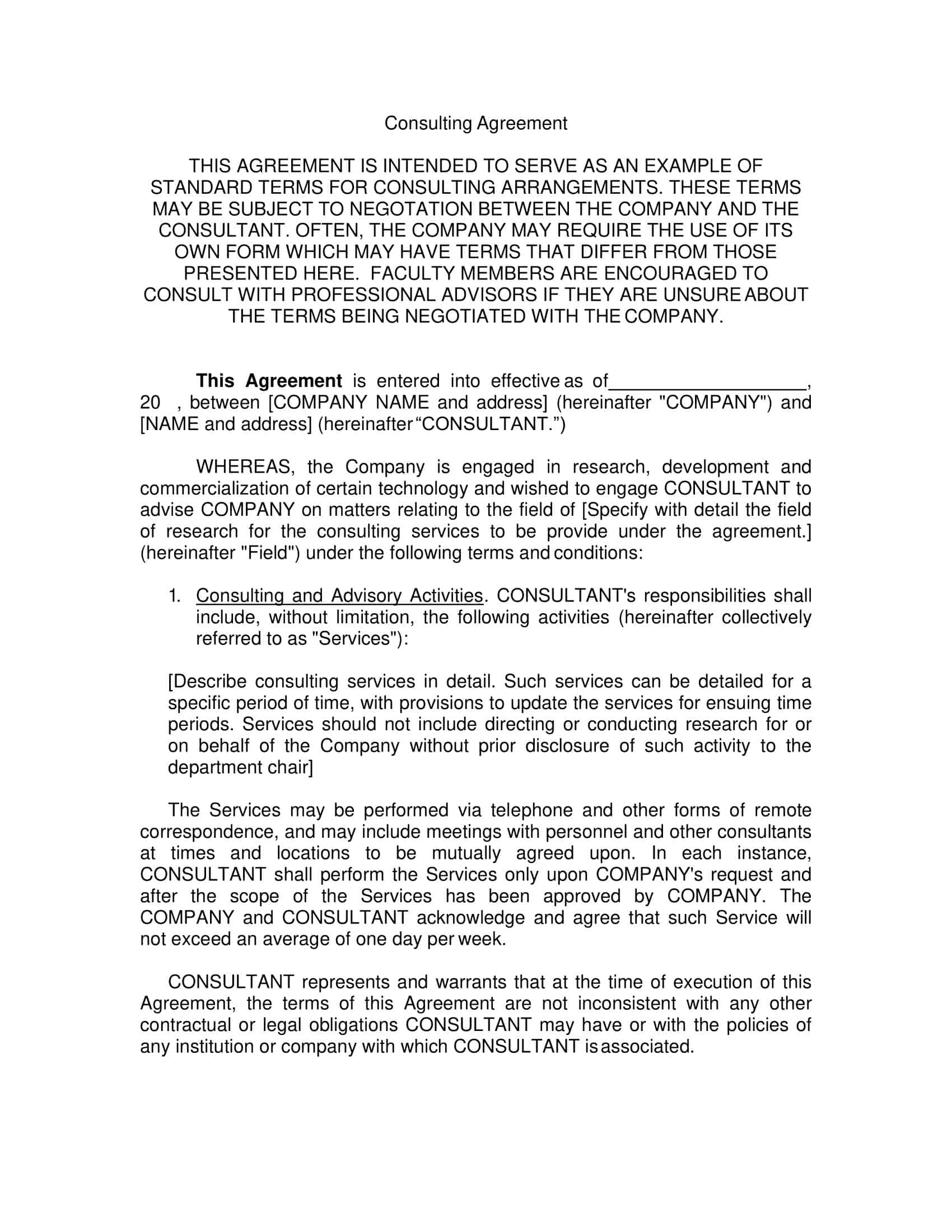













![%100 Free Hoodie Templates [Printable] +PDF 1 Hoodie Template](https://www.typecalendar.com/wp-content/uploads/2023/05/Hoodie-Template-1-150x150.jpg)
![Free Printable Catering Contract Templates [Word, PDF] Simple 2 Catering Contract](https://www.typecalendar.com/wp-content/uploads/2023/05/Catering-Contract-1-150x150.jpg)
![Free Printable Land Contract Templates [Word, PDF] Simple 3 Land Contract](https://www.typecalendar.com/wp-content/uploads/2023/05/Land-Contract-1-150x150.jpg)
